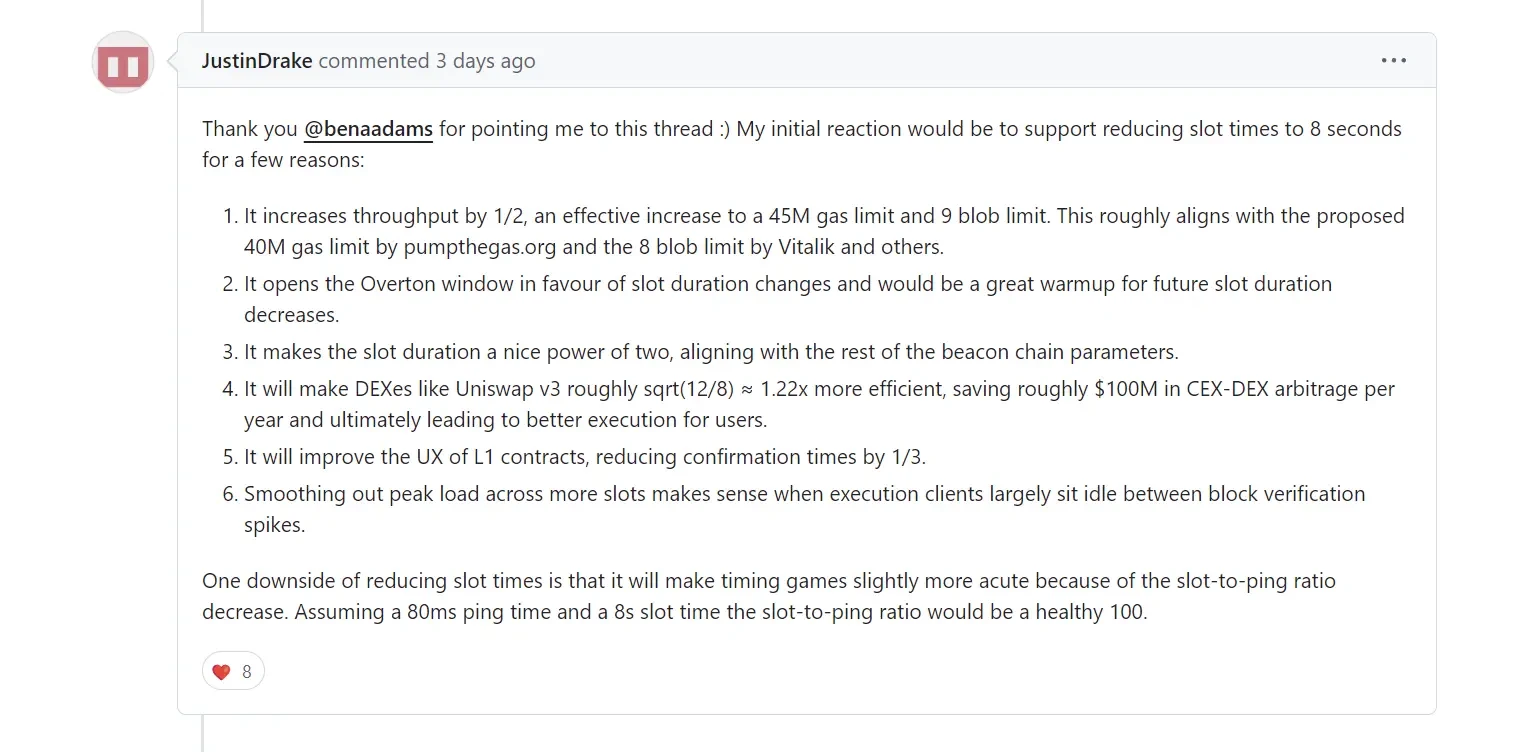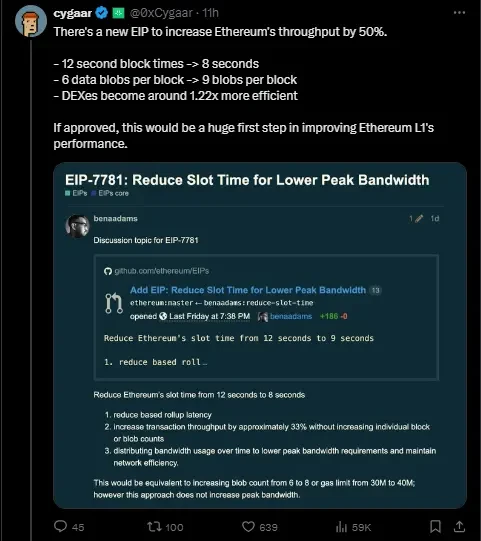Original author: Scof, ChainCatcher
Original editor: Nian Qing, ChainCatcher
Recently, a new improvement proposal (EIP) in the Ethereum community has sparked discussion. The new EIP-7781 proposal aims to increase the overall throughput of the Ethereum network by shortening block times and increasing data processing capacity. This proposal was proposed by Ben Adams, co-founder of Illyriad Games, on October 5. In simple terms, it will shorten the block generation time from 12 seconds to 8 seconds, increase the data processing volume of the block, and increase the throughput by 50%. In addition, it also plans to reduce the fees of the Ethereum Layer 2 network by increasing rollup-based delays.
Ben Adams described EIP-7781 as increasing transaction throughput by about 33% without increasing the number of individual blocks or blobs; distributing bandwidth usage over time to reduce peak bandwidth requirements and maintain network efficiency; this is equivalent to increasing the number of blobs from 6 to 8, or increasing the gas limit from 30M to 40M; but this approach does not increase peak bandwidth.
Justin Drake, a researcher at the Ethereum Foundation, supports this proposal. He believes that shortening the slot time to 8 seconds will significantly improve the overall performance and user experience of the network. This change will not only increase network throughput by 50%, improve the efficiency of de-DEX (such as Uniswap v3), and save about $100 million in CEX-DEX arbitrage costs each year, but also optimize the user experience of Layer 1 smart contracts by shortening the confirmation time by one-third. At the same time, reducing the slot time can better distribute peak loads, making the resource utilization of the executing client more balanced during non-verification peak periods, which is in line with Ethereums long-term expansion goals. Despite the risk of intensified time games, Justin Drake believes that this change is a key step towards a more efficient and scalable network.
Source: https://github.com/ethereum/EIPs/pull/8931
Currently, discussions on EIP-7781 focus on the balance between efficiency improvement and decentralization.
Shortening block times and increasing throughput will obviously improve the user experience, but this may also increase the risk of network centralization. As Web3 researcher Vikram pointed out, verification nodes will face higher hardware and bandwidth requirements, which may make it difficult for individual stakers, especially those who run nodes independently, to keep up with the development of the network. Increasing hardware requirements will weaken the decentralized nature of the network, especially in the Ethereum network, where decentralization and decentralization have always been one of its core advantages. If the entry threshold for stakers is raised, small or individual stakers may exit the network, resulting in more verification rights being concentrated in large institutions. This centralization will go against the original intention of Ethereum, making Ethereums trust model more dependent on a few nodes. Adam Cochran, partner at Cinnehaim Ventures, pointed out that while the proposal seems reasonable, further testing is needed to ensure that it does not have a negative impact on investors working from home.
However, supporters of EIP-7781 believe that although there will be certain hardware requirements, these will not seriously affect decentralization. Vitalik also recently proposed to reduce the staking threshold from 36 ETH to 16 or 24 ETH, which may attract more individuals to participate in staking. At the same time, the proposal can better balance the bandwidth usage of the network and reduce the load pressure during peak hours. In addition, this proposal also means that Ethereum has made more far-reaching considerations for the underlying expansion of Layer 1, while Layer 2 expansion solutions will continue to develop. Therefore, the implementation of EIP-7781 is not only an optimization of the performance of the existing network, but also paves the way for future expansion. Anonymous developer Cygaar called the proposal the first major move to improve Ethereums base layer in an article on X. While most of the development focus has been on Ethereums Layer 2 expansion solutions, this upgrade solves the efficiency problem of the core network.
Overall, EIP-7781 is not only a key step for Ethereum to improve performance, but also needs to consider its long-term impact on network decentralization. If this proposal can be successfully implemented, it will make the Ethereum network more competitive, especially in application scenarios such as DeFi and smart contracts. As of press time, ETH is trading at $2,445, up 1.08% in the past 24 hours.
This article is sourced from the internet: EIP-7781: Increase Ethereum throughput by 50%
Original article by Hootie Rashidifard Original translation: TechFlow Currently, private crypto VC sentiment is the worst since Q4 2022. As we enter the final fundraising sprint of the year, here are some thoughts on the current situation and what to focus on in the future. Average protocol valuations have dropped significantly over the past quarter. Pre-seed valuations are now stable between $10 million and $20 million, while Seed valuations are between $20 million and $30 million. These valuation levels are a stark contrast to the first quarter of 2024, when valuations were nearly double what they are today. So, what causes this situation? Shortage of venture capital VCs holding funds become cautious Venture coins underperform in public markets Investors feel there is a lack of innovation Elections bring significant risk…









